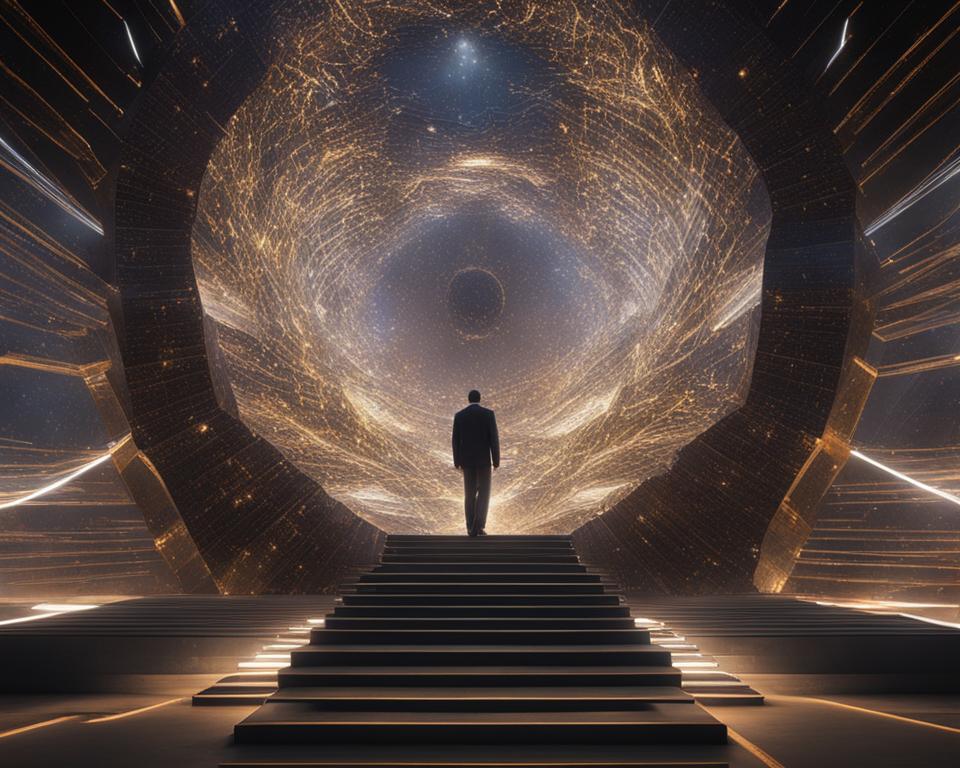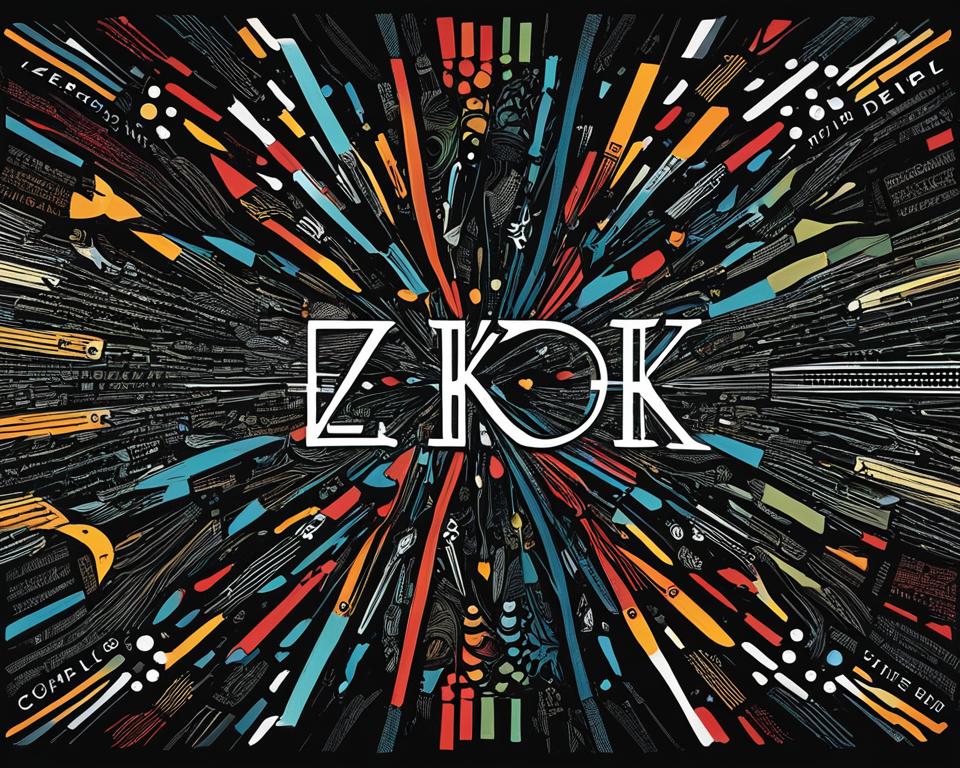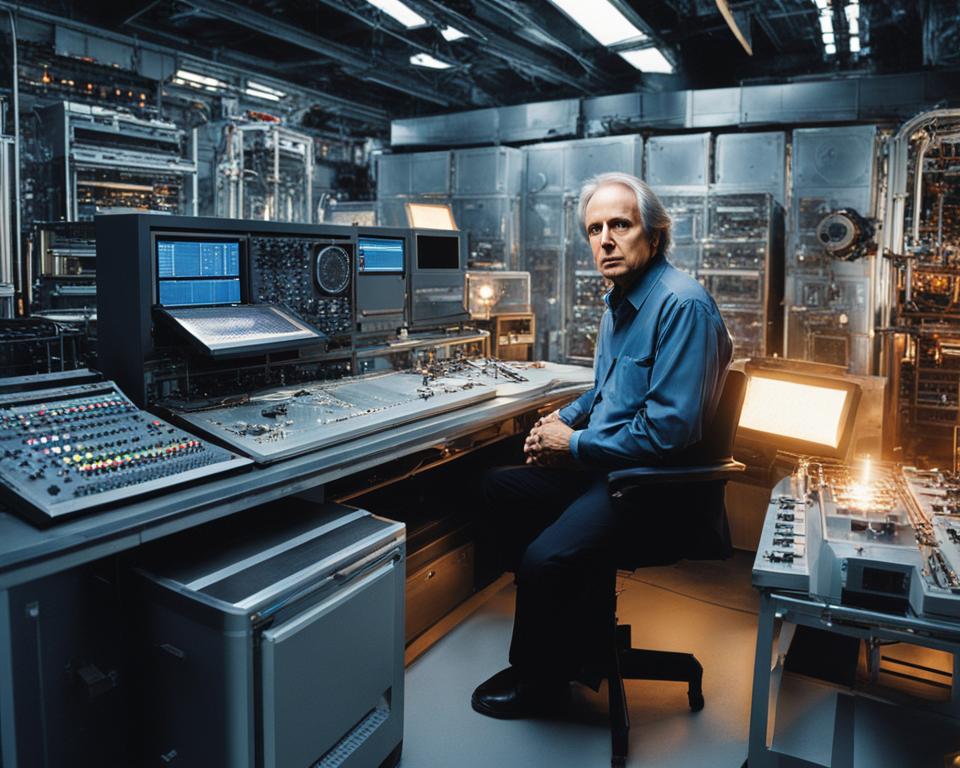Prepare to be immersed in a philosophical treatise on our mortality as Don DeLillo takes you on a journey with his novel “Zero K.” In this audiobook review, we explore the profound existential themes and insights offered by DeLillo’s work.
Key Takeaways:
- “Zero K” presents a thought-provoking exploration of mortality and the human condition.
- DeLillo’s writing style is both poetic and philosophical, lending a unique depth to the novel.
- The book’s characters play integral roles in the plot’s exploration of mortality, technology, and human connection.
- “Zero K” is a standout novel in Don DeLillo’s impressive body of work.
- Those interested in similar themes and styles should consider checking out other audiobooks recommended in this article.
Overview of “Zero K”
Don DeLillo’s novel, Zero K, is a thought-provoking exploration of mortality, technology, and human connection. Set in a remote, futuristic compound in Central Asia, the novel centers around billionaire Ross Lockhart’s attempt to achieve immortality by cryogenically freezing his body. The story follows Ross’s estranged son, Jeff, as he reluctantly joins his father at the facility and grapples with his own mortality and the ethics of life extension technology.
The novel’s themes are underscored by DeLillo’s distinctive writing style, which is marked by spare, incisive prose and a preoccupation with language and symbolism. Zero K is a challenging and thought-provoking read that offers a unique perspective on some of the most pressing issues of our time.
| Act | Summary |
|---|---|
| Act I | Ross Lockhart invites his estranged son, Jeff, to join him at the remote life extension facility in Central Asia |
| Act II | Jeff meets his father’s new wife and navigates the compound’s surreal, futuristic environment |
| Act III | As Ross prepares to undergo the cryogenic freezing process, Jeff wrestles with his own mortality and the ethical implications of the technology |
Setting of “Zero K”
Don DeLillo’s novel “Zero K” is set in a variety of locations that reflect the book’s themes of mortality, technology, and human connection. The novel is primarily set in a remote compound located in the heart of Central Asia, where wealthy individuals can cryogenically freeze their bodies in hopes of resurrection in the future. The bleak and isolated setting of the compound mirrors the characters’ emotional states as they grapple with their mortality and the uncertain future.
However, “Zero K” also includes vivid descriptions of other settings, such as New York City, where protagonist Jeffrey Lockhart reflects on his relationships and past experiences. Additionally, the novel takes a brief detour to explore the bustling metropolis of Bishkek, the capital city of Kyrgyzstan, which provides a sharp contrast to the barren and desolate environment of the compound.
The contrast between these settings highlights the complex themes explored in “Zero K” and adds depth to the characters’ journeys.
Main Characters in “Zero K”
Don DeLillo’s “Zero K” features a small cast of primary characters, each playing a critical role in advancing the novel’s central themes.
The protagonist of the novel is Jeffrey Lockhart, a disaffected man in his thirties who accompanies his wealthy father, Ross, to a mysterious compound in the heart of Asia. Ross is dying and has paid for a radical medical procedure that will allow him to be cryogenically frozen and, hopefully, revived in the future.
At the compound, Jeffrey meets a range of intriguing characters, such as the enigmatic scientist Artis Martineau and the cult-like group known as “the Convergence.” These characters play key roles in the plot, and their motivations and actions provide insight into the novel’s broader themes.
Don DeLillo’s sparse, enigmatic prose has been praised for its ability to convey the inner lives of his characters with remarkable precision. In “Zero K,” this writing style is on full display, allowing readers to fully inhabit the minds of each of the novel’s primary characters.
Themes in “Zero K”
Don DeLillo’s “Zero K” is a complex exploration of mortality, technology, and human connection. The novel’s themes intertwine to create a haunting and thought-provoking narrative that leaves readers questioning the nature of existence.
The Theme of Mortality
One of the predominant themes in “Zero K” is mortality. The novel grapples with the inevitability of death and the ways in which humans try to defy it. DeLillo’s characters seek to transcend death through cryonics, a process that freezes the body in the hopes of eventual revival. This raises questions about the ethics of extending life and the implications of such technology.

The Theme of Technology
Another important theme in “Zero K” is technology. The novel explores the role of technological advancements in shaping society and human identity. DeLillo’s characters question the impact of technology on the human experience, and whether our reliance on technological solutions hinders our ability to connect with others.
The Theme of Human Connection
Finally, “Zero K” is a meditation on the nature of human connection. The novel portrays characters who are isolated and struggling to find meaning in their lives. As they confront mortality and the limits of technology, they question whether there is inherent value in human connection and relationships.
Writing Style in “Zero K”
Don DeLillo’s writing style in “Zero K” is masterfully crafted with deliberate language, symbolism, and storytelling techniques that elevate the novel’s themes of mortality and technology. DeLillo’s prose is characterized by a distinct spareness that lends itself well to the novel’s existentialist themes.
At times, the language in “Zero K” is deliberately ambiguous, leaving the reader to interpret the meaning behind certain passages and ideas. However, this ambiguity is also complemented by a keen attention to detail and description that paints vivid images for the reader.
The narrative is punctuated by introspective moments and philosophical musings that add an element of cerebral depth to the story. DeLillo’s use of symbolism is also notable, with recurring motifs such as cryonics and the desert landscape serving as powerful metaphors for the novel’s larger themes.
Overall, the writing style in “Zero K” is both poetic and thought-provoking, showcasing DeLillo’s mastery of language and storytelling. It is a compelling example of how a writer can use style to enhance the overall impact and meaning of their work.
Narration and Audiobook Performance
The audiobook version of “Zero K” is a stunning achievement, thanks in no small part to the exceptional narration by acclaimed voice actor Thomas Sadoski. Sadoski’s performance captures the mood and tone of DeLillo’s writing perfectly, imbuing the novel with a sense of urgency and haunting beauty.
One notable aspect of the audiobook production is the use of sound effects and music, which help to enhance the already immersive experience of “Zero K.” The subtle background music complements the narration without ever overpowering it, and the sound effects serve to underscore important moments in the story, bringing DeLillo’s words to life in a whole new way.
Overall, the audiobook performance of “Zero K” is nothing short of exceptional, and is highly recommended for anyone looking to experience this powerful and thought-provoking novel in a new and captivating way.
Reception and Criticism of “Zero K”
Don DeLillo’s “Zero K” has received mixed reviews from critics and readers alike, with some praising the novel for its thought-provoking examination of mortality and technology, while others found it to be overly dense and convoluted.
Many readers noted the book’s rich exploration of existential themes, with one Amazon reviewer noting that “DeLillo seamlessly blends themes of death, technology, and morality in a way that is both satisfyingly cerebral and deeply introspective.”
Others, however, found the novel to be difficult to follow and lacking in emotional depth, with some reviewers criticizing the book’s disjointed plot and lack of character development.
Despite the mixed reception, “Zero K” continues to be a popular choice for book clubs and literary enthusiasts, prompting discussions on the nature of mortality and the role of technology in shaping our perceptions of life and death.
Table: Review Analysis of “Zero K”
| Publication | Rating | Comments |
|---|---|---|
| New York Times | Positive | “A haunting study of the end.” |
| Washington Post | Negative | “A confusing, meandering novel.” |
| The Guardian | Mixed | “A novel with bold ideas but flawed execution.” |
Overall, “Zero K” has been a polarizing work that elicits strong reactions from its readers, prompting reflection and contemplation long after the final page has been turned.
Comparisons to Other Don DeLillo Novels
Don DeLillo is a prolific author with a long and impressive list of novels under his belt. While “Zero K” stands out for its resonant exploration of mortality, technology, and human connection, it shares similar themes with several of DeLillo’s other works.
White Noise
Published in 1985, “White Noise” is a postmodern masterpiece that grapples with the anxieties and uncertainties of modern life. Like “Zero K,” it explores themes of technology, death, and the search for meaning in an increasingly chaotic world.
Underworld
DeLillo’s 1997 novel “Underworld” covers a broad sweep of American history, from the 1950s to the 1990s. Like “Zero K,” it explores questions of identity, sacrifice, and the nature of human connection in a fragmented world.
Cosmopolis
Similar to “Zero K” in its introspective tone, “Cosmopolis” is a haunting exploration of the excesses of wealth and power. Published in 2003, it explores the psyche of a young billionaire as he crosses Manhattan in his limousine on a quest for self-discovery and insight.

Impact and Significance of “Zero K”
Don DeLillo’s novel “Zero K” has had a significant impact on the literary world since its release. The book’s exploration of mortality, technology, and existentialism has sparked thought-provoking discussions among readers and critics alike.
“Zero K” has been praised for its unique perspective on the human experience and its examination of the role of technology in our lives. The book’s themes are particularly relevant in today’s society, where advances in technology have raised new questions about what it means to be human.
Moreover, “Zero K” has been recognized as a significant addition to Don DeLillo’s body of work, showcasing his distinctive writing style and thematic exploration. The novel’s impact can be seen not only in its critical reception but also in its influence on contemporary literary discussions.
Overall, “Zero K” stands as a testament to Don DeLillo’s literary significance and the enduring relevance of his work.
Analysis of Don DeLillo’s Body of Work
Don DeLillo is widely regarded as one of the most significant American writers of the past century. With a career spanning several decades, DeLillo has produced an impressive body of work that explores themes such as consumer culture, technology, and the American identity.
In his earlier novels, such as “White Noise” and “Libra,” DeLillo examines the cultural anxieties of the Cold War era. Later works, including “Underworld” and “Point Omega,” explore themes of mortality and the human condition in the modern age.
“Zero K,” published in 2016, marks a continuation of these themes, while also exploring new territory in terms of technology and its implications for the future of humanity.
Recurring Themes and Motifs
Throughout his body of work, Don DeLillo returns to certain themes and motifs, often examining them from new angles in each novel. For example, consumer culture and the power of advertising are explored in both “White Noise” and “Cosmopolis.”
Similarly, references to violence and terrorism appear frequently in DeLillo’s writing. The Kennedy assassination is a major focus of “Libra,” while the events of September 11th inform numerous works, including “Falling Man” and “Point Omega.”
Technological innovation is another recurring motif, explored in novels such as “Players” and “Zero K.” DeLillo questions the consequences of a world in which technology dominates our lives, while also acknowledging its potential to bring us together.
Comparing and Contrasting Novels
| Novel | Themes | Style |
|---|---|---|
| White Noise | Consumer culture, death, identity | Humorous, fragmented prose |
| Libra | Conspiracy theories, the Kennedy assassination | Historical detail, shifting perspectives |
| Underworld | Mortality, American identity, baseball | Elliptical, digressive prose |
| Zero K | Technology, mortality, human connection | Philosophical, meditative |
Comparing and contrasting Don DeLillo’s novels can be a fruitful exercise in understanding the recurring themes and motifs in his work. “White Noise” and “Cosmopolis” both explore the way consumer culture shapes our lives, for example, while “Libra” and “Underworld” both examine the dark underbelly of American history.
“Zero K” stands out in DeLillo’s body of work for its intense focus on the relationship between technology and mortality. While death is a common theme in DeLillo’s novels, “Zero K” offers a unique perspective on how technology might change our relationship to mortality and what it means to be human.
Wrap-up and Final Thoughts
Don DeLillo’s “Zero K” is a thought-provoking novel that delves into existential themes and the human condition. Throughout our audiobook review, we explored the various aspects of the novel, including the plot, characters, themes, and writing style.
One of the strengths of the audiobook was the effective narration and audiobook performance that brought the story to life. However, some readers may find the novel to be slow-paced or abstract in its approach.
Overall, “Zero K” is a significant addition to Don DeLillo’s body of work and is highly recommended for readers interested in existentialist literature. The novel’s exploration of mortality, technology, and human connection offers a unique perspective on the human experience.
As we wrap up our review, we recommend “Zero K” to those looking for a thought-provoking and philosophically rich novel.
Recommended Audiobooks
If you enjoyed the existential themes and thought-provoking style of “Zero K” by Don DeLillo, we recommend the following audiobooks:
- The Road by Cormac McCarthy: Like “Zero K,” this Pulitzer Prize-winning novel explores the depths of humanity in a post-apocalyptic world.
- The Death of Ivan Ilyich by Leo Tolstoy: This classic novel delves into themes of mortality and the search for meaning in life, resonating with the tone of “Zero K.”
- The Heart Goes Last by Margaret Atwood: This speculative fiction novel deals with themes of identity, technology, and the human connection, much like “Zero K.”
These recommended audiobooks offer similar themes and styles that are sure to captivate listeners who enjoyed “Zero K.”
Conclusion
After delving into the depths of Don DeLillo’s “Zero K,” it is clear that this novel is a thought-provoking exploration of existential themes and modern technology. Through its vivid settings, complex characters, and powerful writing style, “Zero K” offers a unique perspective on mortality, human connection, and the impact of technology on our lives.
In terms of the audiobook performance, the narration is commendable, capturing the depth and nuance of DeLillo’s prose. It elevates the reading experience and adds a new dimension to the story.
Overall, “Zero K” is a must-read for fans of Don DeLillo’s work and anyone interested in thought-provoking literature. The novel poses important questions about the meaning of life and our relationship with technology, leaving readers with a renewed appreciation for the human experience.
Recommended Audiobooks
If you enjoyed “Zero K,” we recommend checking out other audiobooks that explore similar themes and styles. Some of our top picks include:
- “The Age of Miracles” by Karen Thompson Walker
- “The Road” by Cormac McCarthy
- “The Dispossessed” by Ursula K. Le Guin
These audiobooks offer similarly thought-provoking examinations of our relationship with technology, mortality, and human connection. Each is expertly narrated and sure to leave a lasting impression on listeners.
FAQ
What is “Zero K” by Don DeLillo?
“Zero K” is a novel written by Don DeLillo. It explores existential themes and delves into the depths of human existence.
What is an overview of “Zero K”?
“Zero K” is a novel by Don DeLillo that encompasses a complex plot, intriguing characters, and thought-provoking themes.
Where is the setting of “Zero K”?
“Zero K” takes place in various locations and environments, which are explored throughout the novel.
Who are the main characters in “Zero K”?
“Zero K” features a cast of main characters, each with their own unique roles, motivations, and development throughout the story.
What are the themes in “Zero K”?
“Zero K” delves into various themes, including mortality, technology, and the profoundness of human connections.
How would you describe the writing style in “Zero K”?
Don DeLillo’s writing style in “Zero K” is characterized by his skilled use of language, symbolism, and storytelling techniques.
How is the narration and audiobook performance of “Zero K”?
The narration and audiobook performance of “Zero K” are evaluated, with notable aspects of the delivery and production discussed.
What is the reception and criticism of “Zero K”?
The reception and criticism of “Zero K” are analyzed, providing an overview of the book’s reviews and highlighting common praise or critique.
How does “Zero K” compare to other Don DeLillo novels?
“Zero K” is compared to other novels by Don DeLillo, exploring similarities or differences in themes, writing style, and character development.
What is the impact and significance of “Zero K”?
The impact and significance of “Zero K” in the literary world are examined, particularly in relation to discussions of mortality, technology, and existentialism.
How does “Zero K” fit within Don DeLillo’s body of work?
“Zero K” is analyzed within the context of Don DeLillo’s larger literary oeuvre, examining recurring themes and motifs in his writing.
What is the wrap-up and final thoughts on “Zero K”?
This section offers a wrap-up of the audiobook review of “Zero K,” summarizing key points discussed throughout the article and providing final thoughts on the novel.
Can you recommend other audiobooks similar to “Zero K”?
In this section, we recommend other audiobooks that readers who enjoyed “Zero K” might also appreciate, highlighting books with similar themes or styles.
What is the conclusion of the audiobook review of “Zero K”?
This final section concludes the audiobook review of “Zero K,” highlighting the key aspects of the novel and providing an overall assessment.



